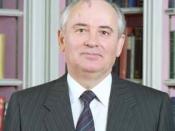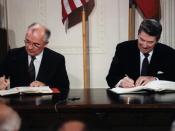The Soviet Union was a global superpower, possessing the largest armed forces on the planet with military bases from Angola in Africa, to Vietnam in South-East Asia, to Cuba in the Americas. When Mikhail Gorbachev succeeded Konstantin Chernenko as General Secretary of the Central Committee of the Communist Party of the Soviet Union in March 1985, nobody expected than in less than seven years the USSR would disintergrate into fifteen separate states.
Gorbachev's attempt at democratising the totalitarian Soviet system backfired on him as the Soviet republics began to revolt against Moscow's control. This was not a case of economic and political crisis producing liberalisation and democratisation. Rather, it was liberalisation and democratisation that brought the regime to crisis point.
After coming to power, Gorbachev implemented a domestic economic reforms that he hoped would improve living standards and worker productivity as part of his perestroika (reconstruction) program. The Law on Cooperatives, enacted in May 1987, was perhaps the most radical of the economic reforms during the early part of the Gorbachev era.
For the first time since Vladimir Lenin's New Economic Policy, the law permitted private ownership of businesses in the services, manufacturing, and foreign-trade sectors. The law initially imposed high taxes and employment restrictions, but it later revised these to avoid discouraging private-sector activity. Under this provision, cooperative restaurants, shops, and manufacturers became part of the Soviet scene.
Gorbachev's introduction of glasnost (openness) gave new freedoms to the people, such as a greater freedom of speech; a radical change as control of speech and suppression of government criticism had previously been a central part of the Soviet system. The press became far less controlled and thousands of political prisoners and many dissidents were released in the spirit of glasnost.
In January 1987, Gorbachev called for demokratizatsiya (democratization) -- the...



Collapse of the Soviet Union
through out this analyis you have chronologically depicted the true essence for the collapse of the soviet union. You have sucessfully restricted the topic to: defining, describing and labelling the event and shown how multiple causation had great significance to the topic sentences. althought the linkage can be reshaped to give the text more flow
0 out of 0 people found this comment useful.